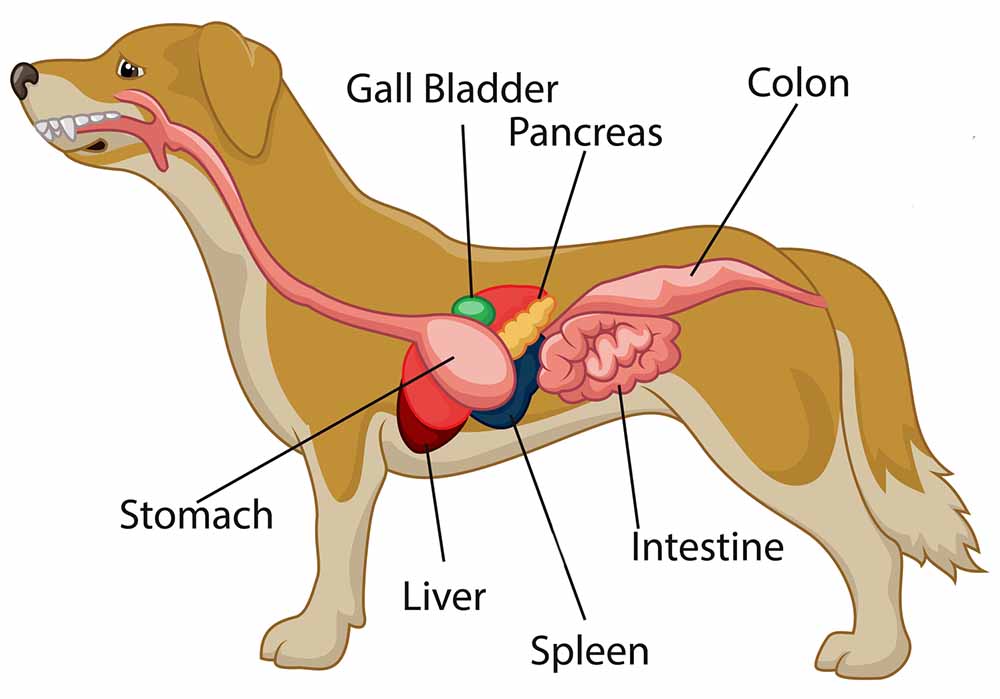Pancreatitis is a common and sometimes life-threatening illness caused by inflammation of the pancreas. There is no breed, sex, or size predisposition and pancreatitis may occur in any dog (Berman, 2020).
However, if a dog with pancreatitis is a senior dog or an older dog with other underlying health issues, the illness may be more severe and symptoms more pronounced. Most dogs receiving treatments are over 5 years old, and the median age is estimated to be about 9-10 years of age (source). So it’s important to recognize symptoms of pancreatitis in senior dogs to take action early and ensure the best outcome for your old friend.
In this article, we will review basic information about pancreatitis, review pancreatitis symptoms in dogs, and answer frequently asked questions about recovery and life expectancy of senior dogs with pancreatitis.
About the Pancreas
The pancreas is a vital organ located in the right upper quadrant of the abdomen, lying right beside and beneath the stomach. This organ has two main functions: the first function is producing insulin to regulate the body’s blood sugar. The second function of the pancreas is to produce digestive enzymes that are secreted into the small intestine. These enzymes include trypsin which digests proteins, lipase to break down fats, and amylase for the digestion of starches.
In a normally functioning pancreas, the enzymes are produced in an inactive state. They are pushed through the pancreatic duct and into the small intestine. Once they reach the small intestine, activation occurs and they are able to perform their role in digestion. In a patient with pancreatitis, these enzymes become activated too early in the process. The prematurely activated enzymes begin their digestion process within the pancreas instead of in the small intestine. The result is digestion of the pancreas itself. The more enzymes that are activated too early, the more severe the disease.

In a healthy dog, pancreatic enzymes are produced in an inactive state. They travel down to the small intestine and get activated to begin digestion. However, in pancreatitis, these enzymes get activated while they are still in the pancreas and result in the auto-digestion of the pancreas itself.
Canine pancreatitis can be either acute (sudden onset) or chronic (returns repeatedly).
Causes of Pancreatitis
While the exact causes of pancreatitis are unclear, it is theorized that it may be triggered by a fatty meal, stress, or medications such as steroids and anticonvulsants. Unfortunately, the vast majority of cases of pancreatitis in dogs have no discernable causes. Potential causes include:
- high-fat diet
- certain medications
- metabolic disorders
- high amounts of lipid in the blood (hyperlipidemia)
- trauma
- shock
Pancreatitis Symptoms with Senior Dogs
Pancreatitis results in intense inflammation which may then spread from the pancreas to the stomach or small and large intestines. This process is extremely painful and may lead to secondary complications such as kidney, heart, and lung failure.
Diagnosis of pancreatitis can be challenging due to the difficulty in accessing the pancreas and the lack of clear clinical signs. Many of the symptoms / clinical signs of pancreatitis in dogs can be present in other conditions. For example: loss of appetite, vomiting, lethargy, and diarrhea.
Common pancreatitis symptoms include:
- abdominal pain – this pain is noted in the majority of dogs with pancreatitis (Berman 2020), 58% of dogs with severe acute pancreatitis in this study.
- vomiting – observed in an estimated 50+% of dogs with pancreatitis
- loss of appetite (anorexia) – estimated 35% of dogs
- diarrhea – estimated 30% of dogs
Other pancreatitis symptoms observed in dogs include:
- fever
- lethargy
- weakness
- shock
- collapse
- nausea
- abdominal distention
- yellow and greasy stool
- depression
- dehydration
Prompt diagnosis and treatment are vital for senior dogs with pancreatitis. Though some cases may be mild initially, untreated pancreatitis can quickly become severe and even life-threatening.
Dogs with severe cases of pancreatitis are typically extremely painful, very lethargic, and may exhibit icterus (yellowing of the skin and eyes).
Long-Term Symptoms
Most dogs with pancreatitis, if treated appropriately, will not have any long-term issues after recovery. However, some dogs that suffer from an episode of acute pancreatitis may be affected by chronic pancreatitis. These dogs must be managed with special diets and other interventions to avoid recurrent episodes. It is rare, but a severe case of pancreatitis may lead to secondary diseases due to damage of the pancreas, including exocrine pancreatic insufficiency (EPI) and diabetes mellitus. These conditions also must be managed for the long-term health of the dog.
FAQ About Dog Pancreatitis with Dr. Jamie Whittenburg
Dr. Jamie Whittenburg is the director of Kingsgate Animal Hospital in TX:
- Can senior dogs with pancreatitis make a full recovery with early treatments?
Yes! Though pancreatitis can be a very severe disease, with early diagnosis and aggressive treatment, even serious cases can pull through. It is important to remember that old age is not a disease, and senior dogs can thrive well into their golden years.
- What is the mortality rate for senior dogs with pancreatitis?
In general, the mortality rate for dogs affected by pancreatitis is high, falling somewhere between 27-58%. (Fabres, 2019)
- How long can an older dog live after being diagnosed with pancreatitis?
Whether or not pancreatitis will have a negative impact on a dog’s life span is difficult to predict. In cases of acute pancreatitis that the dog fully recovers from, no shortening of the lifespan would be anticipated. Chronic pancreatitis could possibly negatively affect overall lifespan if it is not treated and managed appropriately.
- What should I feed a dog with pancreatitis after recovery?
If your dog has suffered an attack of pancreatitis, your veterinarian will most likely recommend an appropriate diet for them after recovery. Most dogs will require diets low in fat.
- What can I do to prevent future episodes?
Dogs with a history of pancreatitis should always be fed an appropriate diet. This will vary from dog to dog, but in most cases, a low-fat diet is needed. Your veterinarian will prescribe or recommend a diet appropriate for your dog.
These dogs should never be fed human food nor allowed to get into the trash. Stress should be kept at a minimum for them, and any other medical conditions should be treated as soon as possible.


